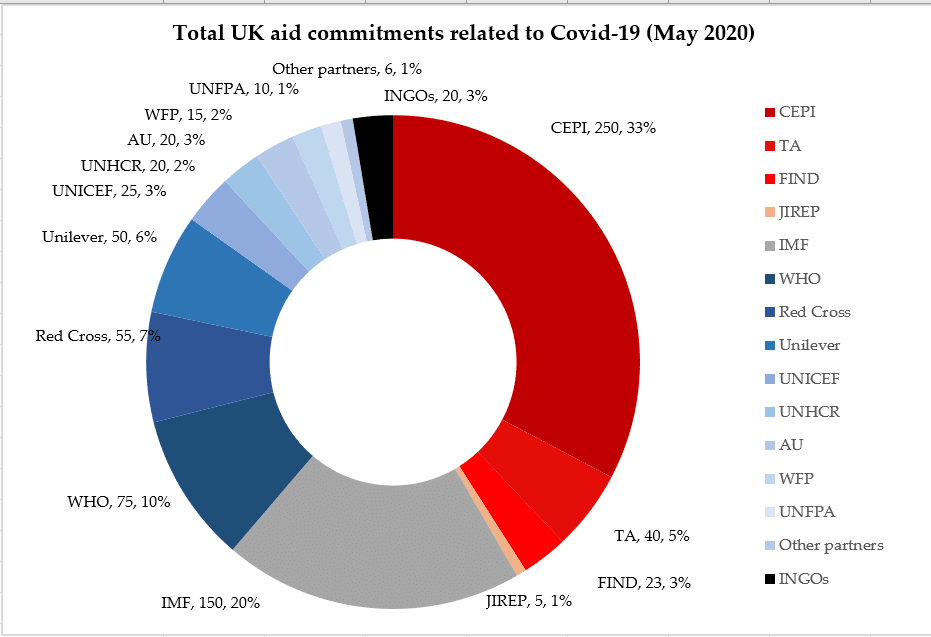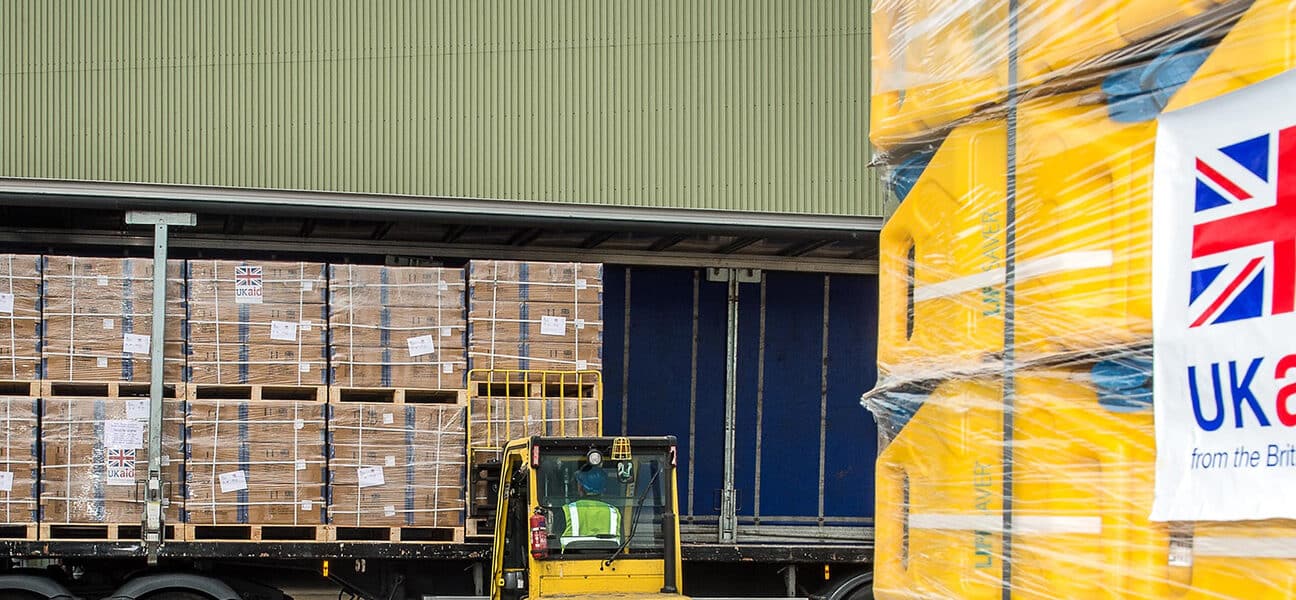How UK aid is being used to combat the Covid-19 pandemic
Type
ManualThere have been a number of recent announcements on UK aid support in response to the developing Covid-19 pandemic, with total pledges since the start of the outbreak now totalling up to ?764 million17 in new funding.
These commitments were made in five main tranches, with an initial ?25 million announced in early February, 1 ?46 million announced on 6th March, 2 ?150 million announced as part of the Budget on 12th March, 3 ?323 million announced on 26th March 4, announced on 12th April5 and a further ?20 million on 20th May18.
UK aid pledges
One-third of this newly-pledged funding (up to ?250 million, or 33%) has been committed to the Coalition for Epidemic Preparedness Innovations (CEPI) to support Covid-19 vaccine development. A total of ?241 million (32%) has been committed to various UN agencies, the International Red Cross and Red Crescent Movement, international NGOs and the African Union to support the humanitarian response to the pandemic in developing countries, up to ?150 million (20%) to an International Monetary Fund (IMF) Trust for debt-related grants intended to ensure that developing countries which are badly affected by the pandemic continue to meet their IMF debt obligations, ?73 million (10%) to support the development of Covid-19 treatments and diagnostic tests, and ?50 million (7%) to support a basic hygiene campaign run by UK multinational Unilever.

A full list of the most recent confirmed UK aid pledges, ordered by value, is provided below:
- Up to ?250 million for the Coalition for Epidemic Preparedness Innovations (CEPI) to support Covid-19 vaccine development.6
- Up to ?150m to the International Monetary Fund’s (IMF) Catastrophe Containment and Relief Trust (CCRT) to provide grants for debt relief for low income countries hit by the epidemic (consisting of an initial commitment of ?75 million of UK aid funding, with a further ?75 million conditional on future need).7
- ?130 million to support the UN’s Global Humanitarian Response Plan for Covid-19, including ?65 million to the WHO, ?20 million to UNICEF, ?20 million to the UN Refugee Agency (UNHCR), ?15 million to the World Food Programme (WFP) and ?10 million to the UN Population Fund (UNFPA).
- ?50 million for the International Red Cross and Red Crescent Movement for pandemic responses in difficult to reach areas (such as those suffering from armed conflict).
- Up to ?50 million to a joint project with UK multinational Unilever to promote good hygiene practices, including a public awareness campaign on the importance of handwashing, measures to increasing access to hygiene products, and a hygiene behaviour change programme, to be delivered with NGO partners.
- ?40 million to the newly-formed Therapeutics Accelerator, a joint initiative by Bill & Melinda Gates Foundation, the Wellcome Trust and Mastercard to identify, assess, develop and scale-up treatments for Covid-19.
- ?23 million to the Foundation for Innovative New Diagnostics (FIND) to support the development of Covid-19 diagnostic tests.8
- ?20 million for international NGOs, including UK charities, for Covid-19 related activities consisting of ?18 million to the Rapid Response Facility (RRF) (with 7 project grants awarded to six pre-qualified NGOs) and ?2 million to the Humanitarian to Humanitarian (H2H) Network.19
- Up to ?20 million to the African Union’s Covid-19 Response Fund to support the recruitment and deployment of health experts, provide training and technical guidance, and co-ordinate response activity across the continent.
- 20
- Up to ?16 million to help vulnerable developing countries prepare for coronavirus (including ?5 million to the International Federation of the Red Cross and Red Crescent Societies; ?5 million to UNICEF to support infection prevention and access to safe water; and ?6 million for extra support for other partners, including for medics and supplies).
- ?10 million to the World Health Organisation’s (WHO) Flash Appeal.9
- Up to ?5 million through the Joint Initiative on Research for Epidemic Preparedness in collaboration with the Wellcome Trust to develop quicker diagnosis methods and perform other essential research for disease control, including ?1m to develop a rapid diagnostic test for COVID-19 for joint manufacture in Africa.
- ?500,000 funding to the Humanitarian-to-Humanitarian (H2H) Network to support BBC Media Action and Internews to create verified information in various languages to tackle specific COVID-19-related mistruths spreading in South East Asia and Africa and support journalists in these regions to write more accurately about the virus, Translators without Borders to monitor false information in various languages and translate validated content from the WHO and other health agencies, and Evidence Aid to update a database of research on diseases each day.
The majority of new UK aid support for tackling the Covid-19 outbreak announced prior to the 26th March funding announcement is being funded through the DFID-administered Overseas Development Assistance (ODA) Crisis Reserve set up following the 2015 Spending Review.10
In addition there are a range of other responses by multilateral institutions which are being supported through existing pre-pandemic UK aid funding allocations, including those by the World Bank 11, the International Monetary Fund (IMF) 12, the European Union,13 the WHO, 14 the Global Alliance for Vaccines and Immunization 15 and the United Nations’ Central Emergency Response Fund (CERF).16
Prior to the most recent funding pledges by the UK, the Wellcome Trust estimated that there was an urgent funding gap of at least $8 billion in new funding required for the global response to Covid-19.
Footnotes
1. Including ?20 million for CEPI on 3rd February, ?20 million for coronavirus research by UK Research and Innovation (UKRI) and the National Institute for Health Research (NIHR) on 4th February, and ?5 million for the WHO’s Flash Appeal (plus an undisclosed amount to support the deployment of experts to the WHO’s Regional Office for Africa (AFRO)) on 8th February. DFID has confirmed that the additional commitment of ?20 million for coronavirus research by UK Research and Innovation (UKRI) and the National Institute for Health Research (NIHR) announced on 4th February will not be funded from the ODA budget.↩
2. Including an additional ?20 million for CEPI, ?16 million to help vulnerable developing countries prepare for coronavirus (including ?5 million to the International Federation of the Red Cross and Red Crescent Societies, ?5 million to UNICEF to support infection prevention and access to safe water, and ?6 million for extra support for other partners), an additional ?5 million for the World Health Organisation’s (WHO) Flash Appeal and ?5 million for the Joint Initiative on Research for Epidemic Preparedness in collaboration with the Wellcome Trust ↩
3. ?75 million to the International Monetary Fund’s (IMF) Catastrophe Containment and Relief Trust (CCRT), with a further ?75 million available conditional on need.↩
4. An additional ?210 million for CEPI in response to that organisation’s call for $2 billion to rapidly develop and manufacture a Covid-19 vaccine, bringing the total pledged to CEPI since the start of the year to ?250 million, ?50 million for a project with UK multinational Unilever to promote good hygiene practices, ?40 million to the newly-formed Therapeutics Accelerator and ?23 million to support the Foundation for Innovative New Diagnostics’ (FIND) development of COVID-19 tests.↩
5. Including ?130 million to the UN’s Global Humanitarian Response Plan for Covid-19 (consisting of ?65 million to the WHO, ?20 million to UNICEF, ?20 million to the UN Refugee Agency (UNHCR), ?15 million to the World Food Programme (WFP) and ?10 million to the UN Population Fund (UNFPA)), ?50 million for the International Red Cross and Red Crescent Movement, and ?20 million to international NGOs.↩
6. CEPI was already supported by UK aid through an initial ?10 million funding commitment in 2018.↩
7. The qualifying criteria for access to support through the CCRT in the case of a life-threatening public health disaster was previously being a low income country and experiencing either (i) a cumulative loss of real Gross Domestic Product (GDP) of 10%; or (ii) a cumulative loss of revenue and increase of expenditures equivalent to at least 10% of GDP, however on 27th March the IMF’s Executive Board agreed to expand the qualification criteria for access, and on 13th April the Board approved immediate debt relief for 25 countries through the CCRT.↩
8. FIND was also already supported by UK aid through the Ross Fund.↩
9. ?5 million of which will be provided by the Department for Health and Social Care (DHSC).↩
10. The ODA Crisis Reserve has a total budget of ?500 million per year. Details of the sources of the most recently announced UK aid funding related to COVID-19 will be added when available.↩
11. In 2018 (the most recent year for which figures are available) the UK made total ODA contributions of ?2.51 billion to the World Bank Group (including the International Bank for Reconstruction and Development (IBRD), the International Development Association (IDA), the International Finance Corporation (IFC) and core operating costs). Further details of initial World Bank COVID-19 emergency response projects funded are available here. ↩
12. In 2018 the UK made total ODA contributions (measured on a grant equivalent basis) of ?37 million (including core contributions and contributions to the Poverty Reduction and Growth Trust (PRGT)).↩
13. In 2019 the UK made estimated total ODA contributions to the EU’s development budget of ?972 million.↩
14. In 2018 the UK made total ODA contributions of ?185 million to the WHO, consisting of assessed contributions of ?13 million and core voluntary contributions of ?172 million.↩
15. In 2018 the UK made total ODA contributions of ?204 million to GAVI.↩
16. In 2018 the UK made total ODA contributions of ?110 million to the UN CERF.↩
17. The UK has also announced its joint participation (along with France and Germany) in providing a package of material and financial support to Iran to help it manage the COVID-19 outbreak, however the exact value of the UK’s contribution to this package is currently unclear. The UK Overseas Territories of St Helena and Monserrat have received a commitment of ?5 million to respond to Covid-19 which is likely to be funded through the UK Overseas Development Assistance (ODA) budget..↩
18. Up to ?20 million to the African Union’s new ‘African Union Covid-19 Response Fund’ to support the recruitment and deployment of health experts, provide training and technical guidance, and co-ordinate response activity across the continent.↩
19. In addition to the original ?500,000 grant listed.↩
20. ?5 million of which will be provided by the Department for Health and Social Care (DHSC).↩

